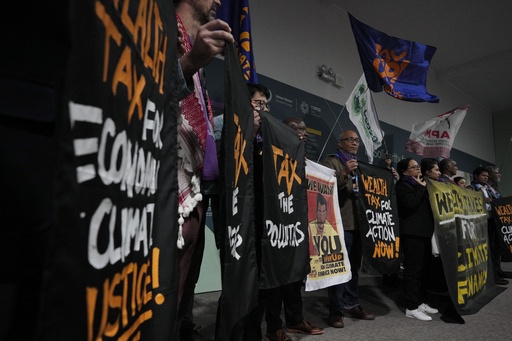
BAKU, Azerbaijan — Youth attending the United Nations climate summit carry with them profound grievances. Many have endured losses—family members, educational opportunities, homes, and even familial connections to their ancestral lands. Despite these challenges, they refuse to relinquish their hope for a better future.
“Being just a poster child has become exhausting for me,” expressed Marinel Ubaldo, recalling that by age 16, she had already witnessed two catastrophic typhoons decimate entire communities in the Philippines. The aftermath forced her to miss significant time in high school, as there were no schools to return to. Now 27, Ubaldo is attending COP29, marking her sixth appearance at the summit where crucial decisions about climate change are made. “While I tend to feel pessimistic, I still hold onto the hope that this COP might provide clearer direction,” she added.
Her skepticism stems from the current situation, which sees a decline in global leadership participation. Political support for climate initiatives appears to be wavering in significant nations such as the United States and Germany. Although many passionate young activists wish to voice their concerns, they face the daunting reality of attending the conference in an authoritarian state that restricts protests and free speech. Additionally, for numerous youth from areas heavily impacted by climate change, reaching the conference is financially challenging and logistically complicated.
Felipe Paullier, the assistant secretary-general for youth affairs at the U.N., pointed out the persistent obstacles that youth encounter, often relegated to the peripheries of the discussions that shape their futures. He emphasized the organization’s efforts to ensure that young voices are more integrated into climate negotiations.
According to UNICEF assistant secretary-general Kitty van der Heijden, climate change disproportionately affects children globally. Their developing bodies struggle with extreme heat, which correlates with increased instances of premature births and childhood malnutrition. “Our efforts are simply inadequate for children worldwide. We are failing them,” she stated.
Consequently, young individuals are increasingly burdened with the responsibility of advocating for climate action. Many participants at COP, and even those unable to attend, expressed feelings of exhaustion—disheartened by the realization that despite their consistent presence and advocacy, tangible results have been minimal. This year marks the third consecutive COP where projections regarding global warming have not improved.
For 20-year-old Raaia Fathimath Sharif from the Maldives, speaking out against climate change feels like an obligation rather than a choice. Her grandmother’s migration to the capital city means that Sharif has never seen her family’s original island. After learning about rising sea levels, she often experienced nightmares of her island submerging, which would leave her waking in tears. “How can I concentrate on anything else when my home country is threatened?” she pondered.
This urgency drives many young individuals to participate in discussions, despite their doubts about the effectiveness of international negotiations in creating real change. Francisco Vera Manzanares, a 15-year-old from Colombia attending his fourth COP, described the U.N. summit as an essential yet “very challenging arena.” He believes that the slow pace of global progress generates a “credibility crisis” in the institutions responsible for cooperation on these critical issues.
“People do listen to children. However, there is a notable difference between listening and truly hearing,” he remarked. He hopes for more adult allies to support youth advocacy in this crisis, where young people have the most at stake. “This is our right. It pertains to our future and our present,” he affirmed.
